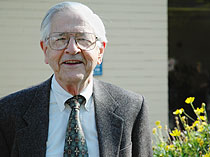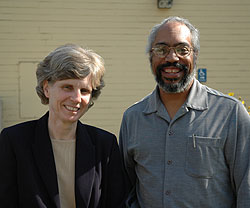Berkeleyan
Berkeley Diversity Research Initiative starts to take shape
Academic leadership welcomes research proposals from all disciplines to advance this crucial institutional effort
![]()
| 04 May 2005
 Professor Emeritus Karl Pister, who turns 80 next month, is closely identified with diversity-related activities at Berkeley, beginning with his dawning realization, four decades ago, of "the level and breadth of social injustice in our society ... and the inequity that existed in terms of access to education in our society." His involvement with diversity issues continues today, as he advises the leadership of the campus's fledgling diversity project. (Deborah Stalford photo) |
That view of California's people, in their astounding variety, as a mother lode of human capital for the state is a notion central to a new campuswide project gradually gathering momentum, the Berkeley Diversity Research Initiative. Invigorated by a recent pledge of material and moral support from Birgeneau, the initiative's leaders propose that for UC to continue to serve a state whose most striking feature, at the beginning of the 21st century, is its multi-cultural character, it must serve the needs of a diverse population and foster understanding of issues and opportunities related to diversity and inclusion.
As Birgeneau said recently, "We must be the intellectual home for research and education in intercultural competence."
New faculty positions
To help make that goal a reality, the chancellor has pledged to fund a number of new faculty positions. These scholars - treading a path broken by longstanding campus departments and organized research units - would work to shed light on "diversity in all its aspects" and would hail, conceivably, from a wide range of disciplines (and ultimately have their home base in varied departments).
"We're looking for new, interdisciplinary collaborations between all groups on campus, new approaches to the general problem of a multicultural society," says Professor of Astronomy Gibor Basri, co-chair of the Diversity Project Coordinating Committee (appointed by the Academic Senate and chancellor's office), whose charge is to help provide leadership on diversity for the campus and beyond. "The idea is to foster scholarly work on diversity, and to acknowledge its importance as a key intellectual enterprise on campus."
| BERKELEY DIVERSITY RESEARCH INITIATIVE WORKING GROUP CO-CHAIRS Alice Agogino, Vice Chair, Academic Senate Berkeley Division; George Breslauer, Dean of Social Sciences, College of Letters & Science OTHER MEMBERS Gibor Basri, Chair, Committee on the Status of Women and Ethnic Minorities; Jan de Vries, Vice Provost, Academic Affairs and Faculty Welfare; Charles Henry, Professor, African American Studies; Denise Herd, Professor, School of Public Health; Robert Knapp, Chair, Academic SenateBerkeley Division; Cathy Koshland, Vice Provost, Academic Planning and Facilities; John Lie, Dean, International and Area Studies; Beatriz Manz, Professor, Geography and Ethnic Studies; Martin Sanchez-Jankowski, Professor, Sociology; Angelica Stacy, Associate Vice Provost for Faculty Equity |
The campus might decide to apply research expertise to health disparities, educational opportunity and achievement, the impact of the criminal-justice system on diverse communities, or political participation and citizenship - to name just a few examples. But work proposed by experts in many other, less-obvious fields - from life sciences to engineering to art practice - will also be welcomed into the research initiative's "big tent." Mechanical engineering's Agogino, for example, would like to see the campus undertake research on bridging the digital divide.
"The initiative is not defined yet in detail," Basri admits, "but it's intended to be that way. We see this as a very broad intellectual enterprise that will build upon our current strengths, highlight these strengths, and bring new areas of research to campus."
A paradigm shift
 Angelica Stacy (left) and Gibor Basri co-chair the Diversity Project Coordinating Committee, which helped launch the Berkeley Diversity Research Initiative. As scientists with a keen interest in diversity-related topics, they say that faculty from any discipline are not only welcome to propose research projects within their fields, but likely have much academic expertise to offer to the developing diversity-research initiative. (Deborah Stalford photo) |
"The way we typically do searches," she notes, "is that faculty in an individual department say, 'We need someone in subdiscipline X,' and then the people in subdiscipline Y say, 'OK, you can hire someone this year, but we get to hire in our area next year.'" That's a way to keep subdisciplines going, she says, but not the way to expand research in new directions. The campus diverged from this model recently to create five new research initiatives - computational biology, nanosciences, metropolitan studies, new media, and the future of the planet - that transcend traditional disciplines. The diversity-research challenge, asserts Pister, is another instance in which "the institutional need transcends the sum of departmental needs," and so warrants taking a paradigm-altering approach to faculty recruitment.
One small step
The decision to prioritize a research initiative grew from a series of campuswide roundtable discussions last spring, following which the Diversity Project Coordinating Committee reviewed and analyzed community input to identify priority issues and recommend action steps. Developing a diversity-related research agenda was one of its key recommendations, and a community forum was held this March to discuss how best to move forward with this project. (Visit facultyequity.chance.berkeley.edu to read the full report.)
Basri cautions that hiring new faculty for a campus diversity-research initiative is "just one small step, and one that by itself does not solve the faculty diversity problem or the mentorship problem." By the former he refers to the small and essentially unchanged percentage of underrepresented minorities on the faculty over the last two decades, by the latter to the relatively small pool of faculty motivated to mentor underrepresented minority and first-generation college students, and the resulting workload for those who take on that challenge.
With regard to the mentorship problem, the report argues that if providing guidance to underrepresented students (e.g., developing teaching techniques that help them succeed academically) helps advance the university's mission, as is often asserted, such activity ought to be acknowledged in the faculty-promotion process. This has not been the case up to now, but recent revisions to the Academic Personnel Manual, which go into effect July 1, make such work part of the evidence of "superior attainment" used in the faculty appointment and promotion process (see "Changes to the UC Academic Personnel Manual to recognize diversity-related activities").
Multifaceted approach
The Berkeley Diversity Research Initiative is expected to be one part of a multifaceted approach to the campus's diversity objectives, with many players helping to define the ultimate shape of the effort. Recently, for instance, in a move not formally part of the initiative but related to its objectives, the chancellor approved an increase in the stipend amounts for graduate students affiliated with the Institute for the Study of Social Change, a campus unit that has been looking at issues of social justice, access, and diversity for nearly 30 years. Law Professor Rachel Moran, who heads the institute, stresses the importance of this kind of support for emerging new scholars and the complexities of furthering the campus's diversity agenda.
"If you don't have a pipeline that's developing a new generation of scholars," she says, "a diversity initiative that's built on faculty hiring alone is not going to be successful - except at the expense of other institutions." Moran says she's "very supportive of any effort to improve and expand the campus's diversity programs, as long as there is a way to build on what's already here."
The campus is indeed looking for ways to better support faculty who are already here on campus providing leadership on diversity and diversity-related research. "Our goal is to find effective ways of supporting the work on diversity already being done on campus, and acknowledging its importance to our overall mission," says Stacy.
Another challenge, say leaders of the project, is to implement the recognition in the Strategic Academic Plan that diversity is an integral part of excellence. "If you're not doing well in the diversity arena," Basri says, "then your overall excellence has been compromised."
Diversity research, by itself, "will not by any means solve problems of diversity," Stacy cautions. "But it will help us bring in some people who can be catalysts; it helps us bring in additional leadership." All of this is "tied to excellence," she adds. "When a group gets homogenous, and everyone thinks exactly like you do, many of your assumptions can go untested. You're not going to be challenged to do the best thinking that you can.
"We have a real opportunity now to bring many people together who are thinking in different ways. This is how you maintain excellence."

